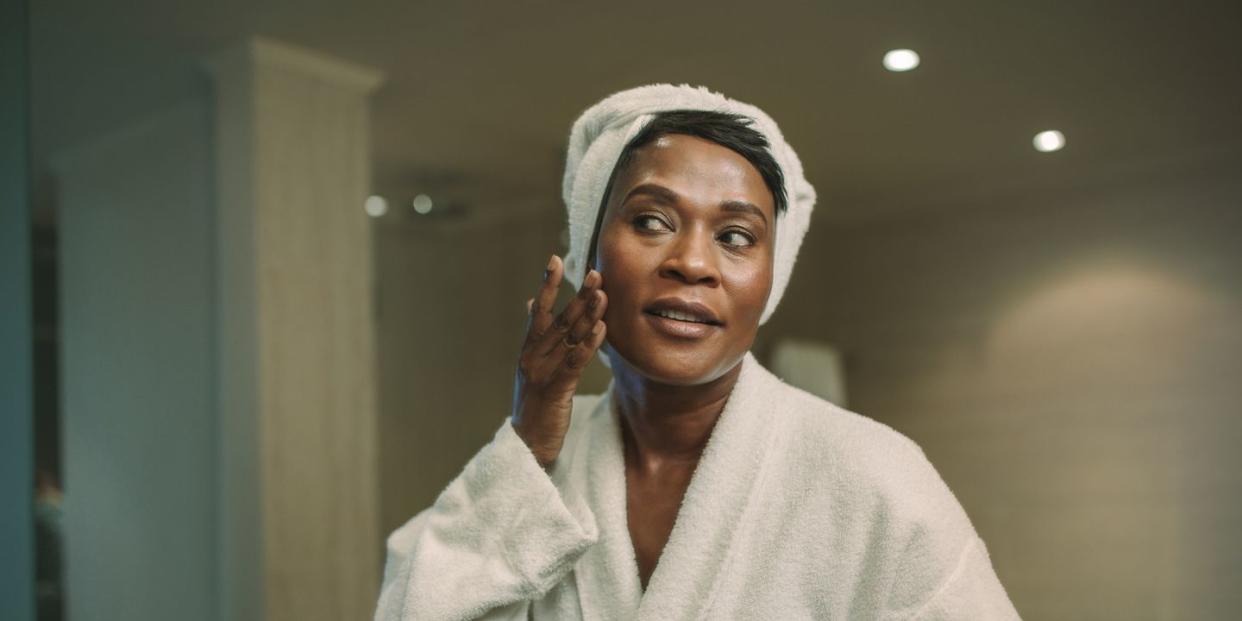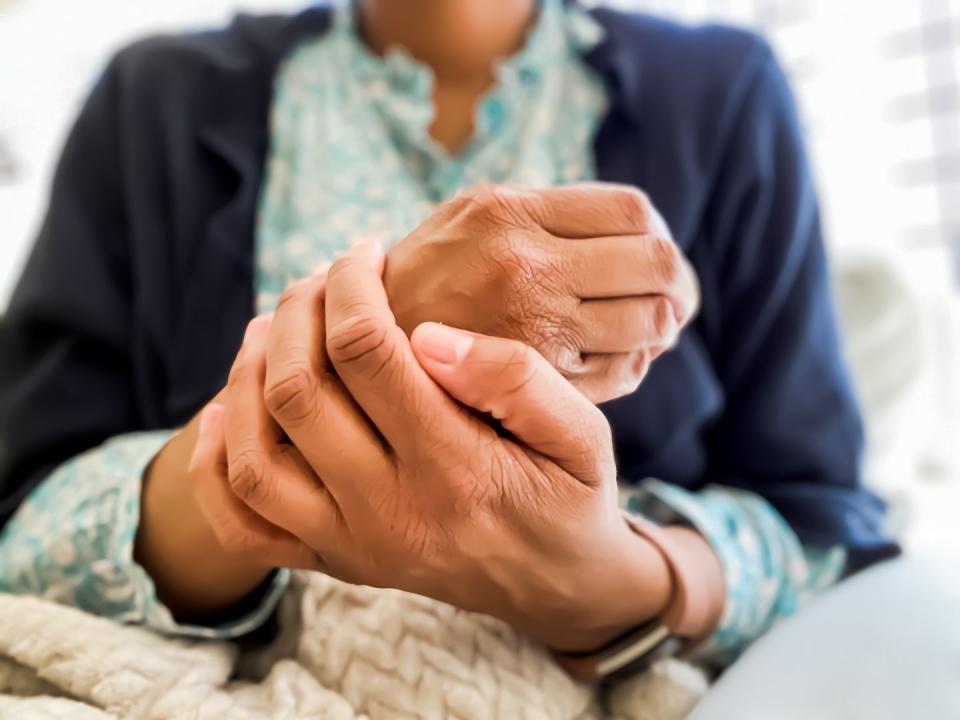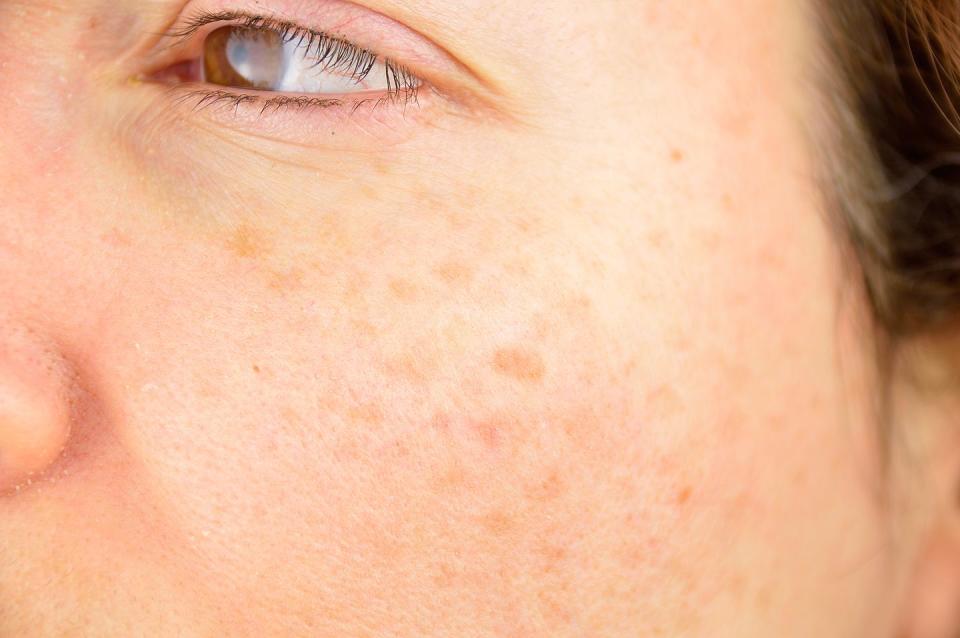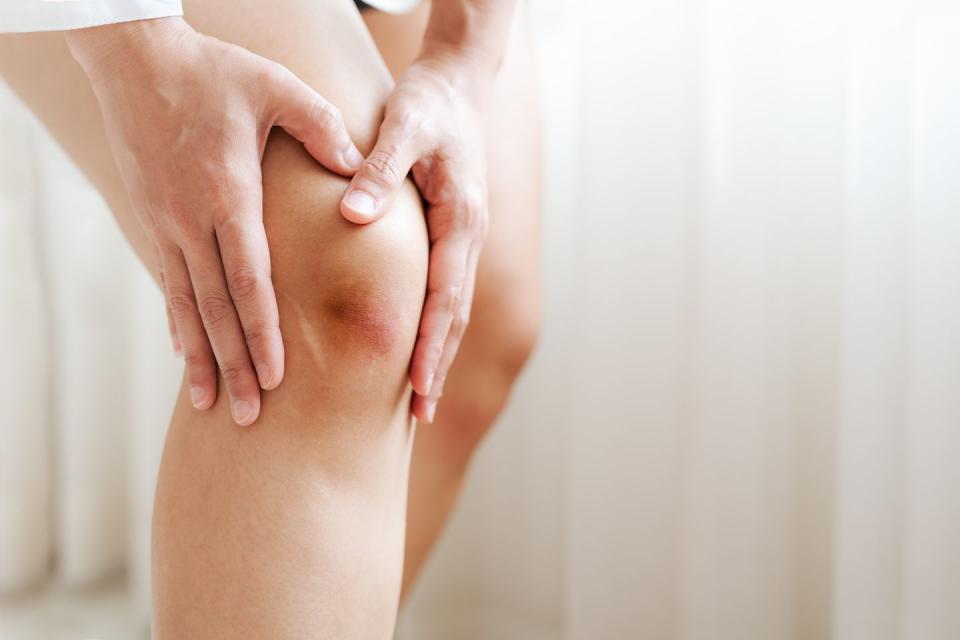The Best Thing to Do If You're Noticing Thinner Skin and Fine Lines During Menopause

"Hearst Magazines and Yahoo may earn commission or revenue on some items through the links below."
By the time you reach menopause, your skin has experienced a lot — roughly five decades of sunshine, wind, freezing weather, acne, makeup, moisturizer, smiles and tears. It's probably not going to look like the dewy skin of your youth — and, let's be honest, the skin of your youth probably wasn't 100% perfect either!
In fact, menopause can be seen as puberty in reverse, especially when it comes to skin. The surge in hormones as you reached reproductive age may have created or exacerbated skin problems such as acne and eczema; similar changes can happen when you finally get to throw away that last box of tampons. As you go through perimenopause and menopause, “the production of estrogen from the ovaries dramatically declines but the levels of androgens, male sex hormones [which include] testosterone, stay the same,” says Shoshana Marmon, M.D., Ph.D, FAAD, an assistant professor and director of clinical research at the Department of Dermatology at New York Medical College. That new imbalance of hormones can cause dryness everywhere — from your eyes to your vagina to yes, your skin.
“Estrogen drives the formation of collagen and elastin, the building blocks essential to keep skin plump, hydrated and strong,” says Dr. Marmon. And so, “as your estrogen declines, it's going to have some direct effects on the skin,” adds Dr. Deirdre Hooper, M.D. a board-certified dermatologist at Audubon Dermatology, who points out that those effects will usually happen in the first few years of menopause.
But it’s not just the decline in estrogen that influences your skin, it’s also the relative levels of androgens, which, as some studies have shown, can influence your skin’s oil production and even hair growth (hello, random chin hair!).
“Now, you’ll have a relative excess of testosterone in your body, which doesn’t necessarily mean it’s sky high — in fact, it might even decline — but when estrogen is outweighed,” you’ll start noticing some differences in the way your skin appears, says Dr. Hooper.
Here are a few changes you might see in your skin, and what you can do about them:
Looser, thinner skin and fine lines
“In the first five years of menopause, a woman can lose approximately 30% of her skin’s collagen, causing a loss of firmness which contributes to the development of wrinkles and jowls,” says Dr. Marmon.
After that, the natural aging process continues causing women to lose about 2% of collagen each year for about two decades, according to experts at the American Academy of Dermatology Association (AADA).
The treatments:
Protect your skin from the sun. Turns out the sun can speed up chronological aging. As UVA rays penetrate the inner layer of your skin, they damage the collagen fibers, according to experts at the Skin Cancer Foundation. This damage abnormally bumps up elastin production as well as repair enzymes that often malfunction and degrade collagen. Doctors say this is part of the phenomenon called “photoaging” and it’s responsible for 90% of visible changes to the skin. The good news: It’s never too late to start wearing sunscreen every day. “The best beauty dollar you will ever invest in is in sunscreen,” says Dr. Hooper. The AADA recommends using one that has broad-spectrum (UVA and UVB) protection, has an SPF of 30 or higher and is water-resistant. (Testers in the Good Housekeeping Institute Beauty Lab chose CeraVe Ultra-Light Moisturizing Face Lotion SPF 30 as the best sunscreen for dry skin.)
Try taking a doctor-prescribed estrogen supplement. Hormone therapy (HT) may help to stop the progression of wrinkles and sagginess, says Dr. Hooper, though many researchers agree, that is not clear if HT can help reduce the fine lines you already have. If you’re interested in trying this option, and especially if you have other bothersome menopause symptoms, such as hot flashes or painful sex, talk to your doctor to see if you are a good candidate for HT.
Try using an estrogen topical cream. “These creams are not going to be as effective as something systemic” like an estrogen supplement that comes in pill, skin patch, ring, gel, cream or spray form, says Dr. Hooper. But some researchers claim they have potential to improve skin dryness, texture, and elasticity and reduce wrinkles.
Use OTC skincare products that include retinol or peptides. According to the AADA, these products can increase collagen in your skin. Two to try: BioRepublic's Peptide Therapy Biocellulose Sheet Mask and Caire's Triple Lift Molecule Mask.
See a dermatologist about tretinoin, laser treatments or chemical peels. These treatments can also stimulate collagen production, says Dr. Hooper. “The earlier you can start treatments that stimulate collagen, the sooner you're going to reap the benefits,” she adds. She often recommends that people use Retin-A, a prescription-strength tretinoin, starting from when they are 18 to slow skin aging. But when it comes to lasers and chemical peels, wait until you see the first signs of wrinkles or looser skin.

Brittle and dry skin
As mentioned above, estrogen promotes water retention and plumpness in your skin. So when your E-levels drop, your skin might get brittle and require more TLC.
The treatments:
Up your moisturizing game. “You're gonna have to possibly start massaging a hand cream into your nails and use lotion after every shower,” says Dr. Hooper. A moisturizer with hyaluronic acid or glycerin can be especially helpful since these help your skin retain water. Overnight Magic from Womaness, a beauty company that specializes in menopausal skin, is a rich nighttime moisturizer that contains 7 types of sodium hyaluronate, which are derived from hyaluronic acid.
Wash with mild cleansers. If you use soap that’s too harsh, your skin may become even drier. Definitely skip out on the deodorant soaps as they can be too much for mature skin, say the experts from the AADA.
Adult acne
The increased prevalence of androgens relative to estrogen can cause pimples and blemishes to pop up especially along the jawline, according to Dr. Marmon. These hormones can ramp up your skin’s oil production, as the aging process slows down our skin’s ability to shed and replace new skin cells. This is a perfect recipe for clogged pores and infection. Luckily this kind of acne is highly treatable, says Dr. Hooper.
The treatments:
Ask about prescription acne medications. For hormonal acne, it’s usually “not [just] going to be an over-the-counter fix,” says Dr. Hooper. Many experts also find that OTC treatments that are typically used to treat teenage acne are too harsh on drier, thinner skin. Dr. Hopper has discovered that with her clients a drug called spironolactone effectively blocks the effects of testosterone in the skin and helps to clear things up.
Try using a salicylic acne wash. Washing your face regularly can help prevent clogged pores, according to the AADA. Salicylic acid is particularly known for exfoliating the skin (i.e. increasing cell turnover) and reducing inflammation. There are also other ingredients that can help to clean out your pores, but always consult your derm to make sure that product fits with your Rx’ed skin routine.

Age spots
“Your whole life, you're getting damaged from the sun and from pollution” says Dr. Hooper. “So as your skin gets thinner it reveals a little bit of the trouble beneath and brown spots become more apparent.”
The treatments:
Use sunscreen, sunscreen, sunscreen. This can’t be emphasized enough. This not only can help fade age spots, but prevent new ones from forming, and protect you from skin cancer.
Ask your dermatologist about age spot treatments. Derms can prescribe Rx bleaching creams, administer laser therapies, microdermabrasion and more to help erase dark spots.
Bruising easily
Thinner skin from sun damage, aging and menopause tends to get bruise more easily, too, says Dr. Hooper.
The treatments:
Ask about hormone treatment. Again, estrogen supplements can help prevent the breakdown of collagen in your skin, according to Dr. Hooper.
Apply sunscreen. While this is not going to make your skin thicker, it can prevent the breakdown of collagen, and thus, thinning.
Try a retinoid cream. Experts at the ADAA have found that retinoid creams work for some women in maintaining collagen in the skin. They also claim that some laser treatments may have an effect, too.

Facial hair
This new testosterone-estrogen balance can also cause the development of thicker facial hair, says Dr. Marmon, particularly under your chin, around the jawline and above your upper lip. If you choose to remove it, you’ve definitely got options. (Although, if you don’t, you’ve got company: More and more are women opting not to.)
The treatments:
Try laser hair removal. You can do this at home on your own, however, at-home devices are less powerful than the one’s a dermatologist would use, according to experts at the Cleveland Clinic. So while they are safer for DIY use, they are not as effective. You may want to have your derm who not only has the better tools, but who also understands your skin and how to minimize side effects while using them.
Ask your derm about prescription hair-reduction creams. This option is effective for some people, according to the AADA.
Are any of these menopausal skin changes unhealthy?
While watching your skin change may be a bit unsettling, know that these changes are perfectly normal, says Dr. Marmon. “However, as we age, the cumulative damage from sun exposure overtime makes our skin more prone to develop skin cancers,” she adds. “It’s important to look out for any new or changing lesions and check in with your dermatologist for a full body exam to rule out anything dangerous.”
In general, it’s a good idea to consult a dermatologist when you’re dealing with any type of skin-related issue — even when they are the naturally occurring changes that happen with menopause.
With all of the beauty influencers out there on Instagram and TikTok it can be so tempting to DIY every aspect of your skincare. “There's just a lot of noise out there in the cosmetics industry and you can waste a lot of money [on products],” says Dr. Hooper.
Find a trusted derm and have them in your ear before you create that perfect skin routine for this next phase of your life.
You Might Also Like

